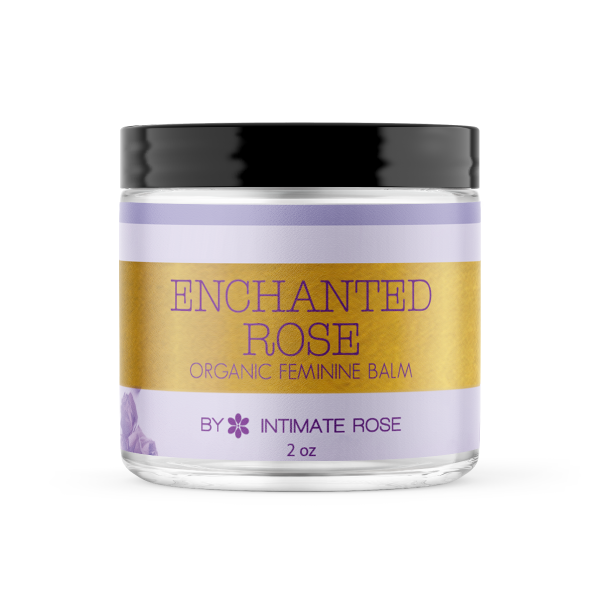Progesterone is one of the two female sex hormones in the body (the other being estrogen). It is largely responsible for regulating the menstrual cycle, preparing the female body for conception, and maintaining healthy pregnancies, however, progesterone also plays a vital role when it comes to sexual desire and managing menopause symptoms.
Read on to learn more about progesterone, what it is, why it’s important for the female body, and the best natural supplement to rebalance your progesterone levels at any age.
What Is Progesterone?
Progesterone is a hormone, meaning it behaves like a messenger that carries information and directions to other functions in the body. It is produced in the adrenal glands, as well as the corpus luteum after ovulation, and by the placenta during pregnancy.
Due to its vital role in fertility, conception, pregnancy, and breastfeeding, progesterone is often called the pregnancy hormone. However, aside from pregnancy, its balanced presence in the body is just as important for women’s overall health and wellness.
The following are the most noticeable ways in which progesterone supports the female body.
How Progesterone Regulates the Menstrual Cycle
In women of reproductive age, progesterone levels are typically low during the first stage of the menstrual cycle. Halfway through the cycle, usually around day 14, the pituitary gland produces two hormones that encourage new eggs to mature and release from the ovarian follicles.
These hormones are known as follicle-stimulating hormone (FSH) and luteinizing hormone (LH) and the process that ensues is referred to as ovulation.
As soon as a new egg is released, the ovarian follicle is replaced by the corpus luteum, which produces progesterone & estrogen to thicken the uterine lining in preparation for the receipt and implantation of a fertilized egg. If the egg is not fertilized, the corpus luteum dissolves, progesterone levels fall, and the inner uterine lining, known as the endometrium, is shed during menstruation.
Progesterone and PMS
The decrease in progesterone and estrogen when an egg is not fertilized is believed to play a role in the symptoms typically associated with premenstrual syndrome (PMS). For many women, the drop in these hormones can cause mood swings, increased feelings of stress, anxiety, tender breasts, and pelvic pain.
The Role of Progesterone During Pregnancy
When an egg is fertilized, the increased production of progesterone & estrogen by the corpus luteum has adequately prepared the uterine lining to receive and nurture the egg. During pregnancy, levels of both estrogen and progesterone continue to rise, reaching up to 10 times higher than usual, to support a healthy pregnancy in the following ways.
In the early stages, progesterone is responsible for stimulating newly developed blood vessels to nourish the endometrium as well as initiating the provision of nutrients to the embryo. Approximately 7-10 days after implantation has occurred, the placenta begins to form and becomes the main producer of progesterone during pregnancy.
In addition to supporting the endometrium and placenta, progesterone also stops the body from producing new eggs and prevents early labor by preventing the uterus from contracting.
Read: Progesterone and Endometriosis
Progesterone and Breastfeeding
During the last trimester of pregnancy, lactation, or the natural production of breast milk, is activated by an intricate collaboration of estrogen, progesterone, and a protein hormone known as human placental lactogen (hPL). This collaboration ensures that the production of the hormone prolactin is increased to grow the breasts and produce milk.
Because the placenta is the main producer of progesterone during pregnancy, once a woman has given birth and the placenta is expelled, progesterone levels will typically decrease.
As soon as new mothers stop breastfeeding prolactin levels also drop, triggering ovulation to resume and progesterone once again begins to play its role in regulating the menstrual cycle, fertility, and conception.
What Happens to Progesterone During Menopause?
The female body naturally responds to aging by recognizing that the reproductive years are coming to an end and signals the production of progesterone and estrogen to slow and incrementally drop during perimenopause and menopause.
This drop in the production of the female sex hormones often results in the symptoms associated with menopause. These can include but are not limited to; dry skin, hot flashes, insomnia, irregular menstruation, low libido, mood swings, increased stress or anxiety, night sweats, slower metabolism, vaginal dryness, pain during sex, and weight gain.
Hormonal and Non Hormonal Menopause Relief

High & Low Levels of Progesterone
Progesterone levels typically rise and fall throughout a woman’s life, depending on whether she is menstruating, pregnant, breastfeeding, or going through menopause. Research has revealed that high levels of progesterone do not cause any adverse impacts on women’s health. Indeed, high levels of progesterone are used in most oral contraceptives to prevent the body from ovulating.
However, low levels of progesterone can have several side effects on women of reproductive age including irregular or no menstruation, infertility, and ovarian issues, as well as miscarriages or pre-term labor.
In addition to typical menopausal symptoms, low levels of progesterone during perimenopause can also increase the risk of abnormal uterine bleeding, heart disease, and osteoporosis in postmenopause.
What Helps to Balance Female Hormones Like Progesterone & Estrogen?
Chasteberry, also known as Vitex Agnus-Castus, is a berry tree native to the Mediterranean and Central Asia, the berries from which have long been used to treat conditions associated with the female reproductive system.
Chasteberry does not contain hormones, so it is not a form of hormone replacement therapy, however, its reaction with the pituitary gland helps it to function better when it comes to the production of hormones.
Now available in supplement form, like these from Intimate Rose, studies reveal that Chasteberry is highly effective to rebalance fluctuating female hormones during PMS, perimenopause, and menopause, thereby relieving uncomfortable symptoms.
How Chasteberry Helps PMS
Research has shown that a regular Chasteberry supplement interacts positively with the pituitary gland to help balance the production of luteinizing hormone and follicle-stimulating hormone during the menstrual cycle. This, in turn, stimulates a more balanced production of progesterone and estrogen, thereby reducing PMS symptoms like acne, migraines, pelvic pain, and tender breasts.
The interaction of Chasteberry with the pituitary gland also helps to decrease elevated levels of prolactin, which further promotes the rebalancing of progesterone and estrogen.
In a recent study, 93% of women who took Chasteberry supplements over three consecutive months reported a significant improvement in PMS symptoms like pelvic discomfort, irritability, premenstrual acne, and food cravings.
Chasteberry For Menopause
While many women turn to hormone replacement therapy to find relief from the hormonal fluctuations associated with menopause, Chasteberry supplements are proving just as helpful without any of the risky side effects. Once again it is Chasteberry’s interaction with the pituitary gland that contributes to the rebalancing of hormones not only during menopause but perimenopause and postmenopause too.
Behaving like an adaptogen that soothes the body’s stress response, Chasteberry helps to alleviate increased feelings of depression or anxiety during menopause, as well as hot flashes, lack of libido, night sweats, vaginal dryness, itching, and pain during sex. In addition, a regular Chasteberry supplement reduces the risk of heart disease, osteoporosis, and uterine bleeding for postmenopausal women.
Is Chasteberry Safe During Pregnancy & Breastfeeding?
No, Chasteberry is not recommended for women who are pregnant or breastfeeding. While this proven ancient remedy is hugely beneficial for treating hormonal imbalances connected to PMS, perimenopause, and menopause, it is not safe during pregnancy or while lactating.
This is due to the balancing effect that Chasteberry has on hormones like progesterone and estrogen, which are required in elevated levels to sustain a healthy uterine lining during pregnancy. Chasteberry can also reduce the production of prolactin, which is required to produce breast milk.

Get your personalized HRT plan!

Get your personalized HRT plan!
Conclusion
As one of the two female sex hormones, progesterone is important for regulating menstruation, encouraging fertility and conception, as well as supporting healthy pregnancies.
Although progesterone can fluctuate throughout a woman’s life, high levels are not known to result in any negative effects on the body, but low levels of progesterone can intensify PMS and menopause symptoms, as well as affect fertility.
If you are considering taking a natural supplement like Chasteberry or Vitex to rebalance hormones during PMS or menopause, it’s always best to check with your doctor first to ensure new supplements will not react with any current medication you are taking.
FAQs
What does progesterone do to females?
Progesterone is a crucial female sex hormone that regulates the menstrual cycle, prepares the uterus for pregnancy, and supports early stages of gestation. It also plays a role in sexual desire and maintains the uterine lining for potential embryo implantation.
What is progesterone used for?
Progesterone is used to regulate menstruation, support pregnancy by maintaining the uterine lining, and prepare the breasts for lactation. It is also prescribed in hormone replacement therapy and to address menstrual disorders or infertility issues.
What are the signs of low progesterone?
Signs of low progesterone include irregular menstrual periods, headaches, difficulty conceiving, mood changes, anxiety or depression, trouble sleeping, hot flashes, and bloating or weight gain. During pregnancy, low progesterone may cause spotting, low blood sugar, breast tenderness, fatigue, or miscarriage.
How does lack of progesterone affect you?
A lack of progesterone can lead to irregular menstrual cycles, difficulty maintaining pregnancy, mood swings, sleep disturbances, and increased risk of miscarriage. It may also cause symptoms similar to menopause, such as hot flashes and decreased libido.
What age do you get low progesterone?
Progesterone levels naturally decline with age, particularly during perimenopause, which typically begins in the late 30s to early 40s. This decline continues through menopause, usually occurring between ages 45 and 55, leading to various symptoms associated with reduced hormone levels.
What happens if a woman takes progesterone?
Taking progesterone can help regulate menstrual cycles, support early pregnancy, alleviate menopausal symptoms, and address hormonal imbalances. It may also be used in hormone replacement therapy to reduce the risk of endometrial cancer in postmenopausal women receiving estrogen.
What are the benefits of a woman taking progesterone?
Benefits include regulation of menstrual cycles, support for pregnancy, relief from menopausal symptoms, and treatment of progesterone deficiencies. Progesterone therapy can also improve mood, sleep quality, and overall quality of life in women with hormonal imbalances.
When should a woman take progesterone?
A woman may need to take progesterone if she has irregular menstrual cycles, is undergoing fertility treatments, experiences menopausal symptoms, or has a diagnosed progesterone deficiency. It's essential to consult a healthcare provider to determine the appropriate timing and dosage.
What happens to your body when you start taking progesterone?
Starting progesterone therapy can stabilize menstrual cycles, support pregnancy, alleviate menopausal symptoms, and improve mood and sleep. Some individuals may experience side effects like bloating, breast tenderness, or mood changes, which should be discussed with a healthcare provider.
How can I check my progesterone levels at home?
At-home progesterone test kits are available, typically involving a finger-prick blood sample or saliva sample sent to a lab for analysis. While convenient, it's advisable to discuss results with a healthcare provider to ensure accurate interpretation and appropriate action.
References
You & Your Hormones – Progesterone - https://www.yourhormones.info/hormones/progesterone/
The National Infertility Association - Progesterone and Pregnancy: A Vital Connection - https://resolve.org/learn/infertility-101/female-reproductive-system/progesterone-and-pregnancy/
The North American Menopause Society – Changes in Hormone Levels - https://www.menopause.org/for-women/sexual-health-menopause-online/changes-at-midlife/changes-in-hormone-levels
National Library of Medicine - Systematic Review of Premenstrual, Postmenstrual and Infertility Disorders of Vitex Agnus Castus - https://www.ncbi.nlm.nih.gov/pmc/articles/PMC5308513/
National Library of Medicine -Comparison of Vitex agnus-castus Extracts with Placebo in Reducing Menopausal Symptoms: A Randomized Double-Blind Study - https://www.ncbi.nlm.nih.gov/pmc/articles/PMC6887765/
National Library of Medicine - Comparison of Vitex agnus-castus Extracts with Placebo in Reducing Menopausal Symptoms: A Randomized Double-Blind Study - https://www.ncbi.nlm.nih.gov/pmc/articles/PMC6887765/

Get your personalized HRT plan!












